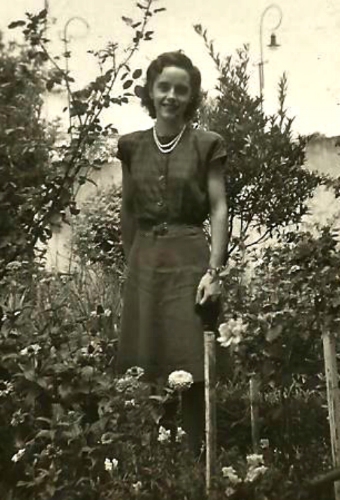Abuela's Special Vegetable Soup
Chunky vegetable soup at your house was a treat. The fun began when you started to prepare the vegetables. I was the happy recipient of your discarded strips of potato and carrot peel, celery ribs, fennel stalks. Butter knife in hand, I set to work industriously in the covered patio outside your kitchen.
We both chopped, sliced, and stirred in unison, you at the kitchen counter; me, at a picnic table, listening to your crystalline voice. You always loved to sing.
Abuela in her garden
You brought your soup to the table with a radiant smile. My pretend soup ended up in the trash.
You didn’t complain if your 11 grandchildren made a mess, but you never tolerated rude language. “¡Te voy a poner una papa caliente en la boca!” The threat of a hot potato in our mouths was an effective deterrent.
Years later, when it was time for me to make soup for real, I asked you what made your soup taste so special. Your green eyes twinkled and you settled down for a chat, matecup in hand. The secret ingredient included flavors from the land of your ancestors, Spain.
“Mix a couple of tablespoons of olive oil and a heaped tablespoon of smoked paprika and heat over a low fire until the paprika dissolves,” you said. The paprika imparts a smoky yet subtle flavor. “Make sure you don’t burn it, or it’ll taste bitter. Then trickle this infused oil on the soup.”
These orangey-red pools of oil carry flavor, family traditions and childhood memories.
- Ana Astri-O’Reilly is a fully bilingual Spanish-English travel blogger and writer originally from Argentina. She now lives in Dallas, USA, with her husband. Besides writing on her travel blogs, Ana Travels and Apuntes Ideas Imagenes, Ana has published travel and food articles in a variety of outlets as well. She likes to eat good food, read good books and play tennis (she’s a beast at the net!)



